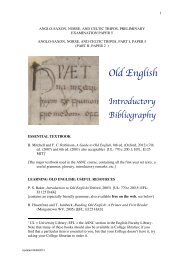Scandinavian history in the Viking age - Department of Anglo-Saxon ...
Scandinavian history in the Viking age - Department of Anglo-Saxon ...
Scandinavian history in the Viking age - Department of Anglo-Saxon ...
You also want an ePaper? Increase the reach of your titles
YUMPU automatically turns print PDFs into web optimized ePapers that Google loves.
<strong>Scand<strong>in</strong>avian</strong> History <strong>in</strong> <strong>the</strong> Vik<strong>in</strong>g Age<br />
<strong>in</strong>troduction and selected bibliography by Timothy Reuter (2002) [UL 79.c.200.3]; fur<strong>the</strong>r excerpts can<br />
be found <strong>in</strong> (B1):41-45 (<strong>the</strong> geographical description), 220-21 (Uppsala). A Swedish translation with<br />
useful notes and m<strong>in</strong>or essays is E. Svenberg et al., Adam av Bremen: historien om Hamburgstiftet och<br />
dess biskopar (1984) [UL 62:1.c.95.24]. For <strong>the</strong> textual <strong>history</strong>, see A.K.G. Kristensen, Studien zur Adam<br />
von Bremen Überlieferung, Skrifter udgivet af Det historiske Institut ved Københavns Universitet 5<br />
(1975) [UL 532:15.b.95.2]; for a study <strong>of</strong> Adam’s historiographical approach, C.F. Hallencreutz, Adam<br />
Bremensis and Sueonia: a fresh look at Gesta Hammaburgensis ecclesiae pontificum, Skrifter rörande<br />
Uppsala universitet, C: Organisation och historia 47 (1984) [UL L243.36:c.U1.5.4]<br />
For much <strong>of</strong> this period <strong>the</strong> responsibilities <strong>of</strong> <strong>the</strong> archbishops <strong>of</strong> Hamburg-Bremen extended more<br />
widely to <strong>in</strong>clude all <strong>the</strong> ‘Transalb<strong>in</strong>gians’, ie. <strong>the</strong> peoples liv<strong>in</strong>g beyond (to <strong>the</strong> north and east <strong>of</strong>) <strong>the</strong><br />
river Elbe. Although <strong>the</strong> <strong>history</strong> and conversion <strong>of</strong> <strong>the</strong> Slavic tribes <strong>of</strong> eastern Europe falls outside <strong>the</strong><br />
scope <strong>of</strong> this bibliography, events here are <strong>of</strong>ten <strong>in</strong>terest<strong>in</strong>g as comparative material for Scand<strong>in</strong>avia<br />
itself. An <strong>in</strong>terest<strong>in</strong>g text which gives <strong>the</strong> eastern European perspective, as well as provid<strong>in</strong>g <strong>the</strong> only<br />
evidence for Adam <strong>of</strong> Bremen’s actual name, is:<br />
[B74] Helmold <strong>of</strong> Bosau. Around 1170 Helmold wrote a <strong>history</strong> <strong>of</strong> <strong>the</strong> conversion <strong>of</strong> <strong>the</strong> Slavs, although<br />
largely from <strong>the</strong> perspective <strong>of</strong> German imperialism mov<strong>in</strong>g eastwards. Text: B. Schmeidler, Helmoldi<br />
presbyteri Bozoviensis Cronica Slavorum, 2nd edn, MGH SRG (1909) [UL 570:01.c.8.24]. Transl.: F.J.<br />
Tschan, The chronicle <strong>of</strong> <strong>the</strong> Slavs by Helmold, priest <strong>of</strong> Bosau, Records <strong>of</strong> civilization: sources and<br />
studies 21 (1935) [UL RE.159.537]. Text and German transl.: H. Stoob, Helmold von Bosau:<br />
Slawenchronik, AQDGM 19 (1963) [UL 570:01.c.57.19]<br />
English and <strong>Anglo</strong>-Norman sources<br />
English and <strong>Anglo</strong>-Norman sources for <strong>Scand<strong>in</strong>avian</strong> <strong>history</strong> are at once more numerous yet less<br />
<strong>in</strong>formative than those from <strong>the</strong> cont<strong>in</strong>ent. To some extent this is a matter <strong>of</strong> preservation and <strong>in</strong>terest;<br />
while <strong>the</strong> German missionaries had Adam <strong>of</strong> Bremen to record <strong>the</strong>ir deeds, <strong>the</strong> large numbers <strong>of</strong> English<br />
missionaries <strong>in</strong> <strong>the</strong> North failed to ga<strong>in</strong> such an audience, ra<strong>the</strong>r surpris<strong>in</strong>gly given <strong>the</strong> large amount <strong>of</strong><br />
evidence relat<strong>in</strong>g <strong>the</strong> activities <strong>of</strong> <strong>the</strong> <strong>Anglo</strong>-<strong>Saxon</strong>s <strong>in</strong> Germany <strong>in</strong> <strong>the</strong> seventh and eighth centuries. In<br />
addition, <strong>the</strong> close cultural contacts between England and Scand<strong>in</strong>avia <strong>in</strong> <strong>the</strong> late Vik<strong>in</strong>g <strong>age</strong>, particularly<br />
dur<strong>in</strong>g <strong>the</strong> period <strong>of</strong> <strong>the</strong> <strong>Anglo</strong>-Danish k<strong>in</strong>gs <strong>in</strong> <strong>the</strong> first half <strong>of</strong> <strong>the</strong> eleventh century, means that many<br />
texts from <strong>the</strong> time have much to say about <strong>the</strong> Norse, but are <strong>of</strong>ten irritat<strong>in</strong>gly reticent about <strong>the</strong>ir<br />
neighbours across <strong>the</strong> North sea as opposed to <strong>the</strong>ir (unwanted) neighbours next door <strong>in</strong> England itself.<br />
Source anthologies and guides<br />
The follow<strong>in</strong>g are all useful collections <strong>of</strong> material, <strong>in</strong>clud<strong>in</strong>g some <strong>Scand<strong>in</strong>avian</strong> verse, <strong>in</strong> translation:<br />
[B80] M. Ashdown, English and Norse documents relat<strong>in</strong>g to <strong>the</strong> reign <strong>of</strong> E<strong>the</strong>lred <strong>the</strong> unready (1930)<br />
[UL 717:1.c.90.3]<br />
[B81] D. Whitelock, English historical documents vol. 1, c. 500-1042, 2nd edn (1979; repr. 1996) [EHD,<br />
UL 540:13.c.95.32, -.69)<br />
[B82] D. Douglas and G. Greenaway, English historical documents vol. 2, 1042-1189, 2nd edn (1981)<br />
[UL 540:13.c.95.33, -.70]<br />
Histories and chronicles<br />
This group is aga<strong>in</strong> only a selection <strong>of</strong> <strong>the</strong> available sources, focuss<strong>in</strong>g firstly on those which have some<br />
contribution to make to <strong>the</strong> <strong>history</strong> <strong>of</strong> Scand<strong>in</strong>avia itself:<br />
[B85] Bede’s Historia ecclesiastica ‘ecclesiastical <strong>history</strong>’, which extends to <strong>the</strong> year 731, is <strong>of</strong> m<strong>in</strong>or<br />
<strong>in</strong>terest for his comments on <strong>the</strong> orig<strong>in</strong>s <strong>of</strong> <strong>the</strong> Angles, <strong>Saxon</strong>s, and particularly Jutes; <strong>the</strong> orig<strong>in</strong>s <strong>of</strong> <strong>the</strong><br />
Jutes has long been a controversial issue, and can be tied <strong>in</strong> with <strong>the</strong> relations between o<strong>the</strong>r tribal groups<br />
such as <strong>the</strong> Danes and <strong>the</strong> ‘Eruli’ <strong>in</strong> <strong>the</strong> pre-Vik<strong>in</strong>g period (C12), cf. also (B30). Text and transl.: B.<br />
Colgrave and R.A.B. Mynors, Bede’s ecclesiastical <strong>history</strong> <strong>of</strong> <strong>the</strong> English people (1969; corr. repr. 1991)<br />
[UL 716:01.c.2.37; repr. 716:01.c.2.78]. Transl.: L. Sherley-Price et al., Bede, Ecclesiastical <strong>history</strong> <strong>of</strong><br />
<strong>the</strong> English people, rev. edn (1990) [UL 9000.d.6988]<br />
[B86] The <strong>Anglo</strong>-<strong>Saxon</strong> chronicle is a vast, sprawl<strong>in</strong>g set <strong>of</strong> annals <strong>in</strong> several versions that cover<br />
English <strong>history</strong> up until <strong>the</strong> middle <strong>of</strong> <strong>the</strong> twelfth century (<strong>in</strong> its latest form, <strong>the</strong> Peterborough chronicle).<br />
12






